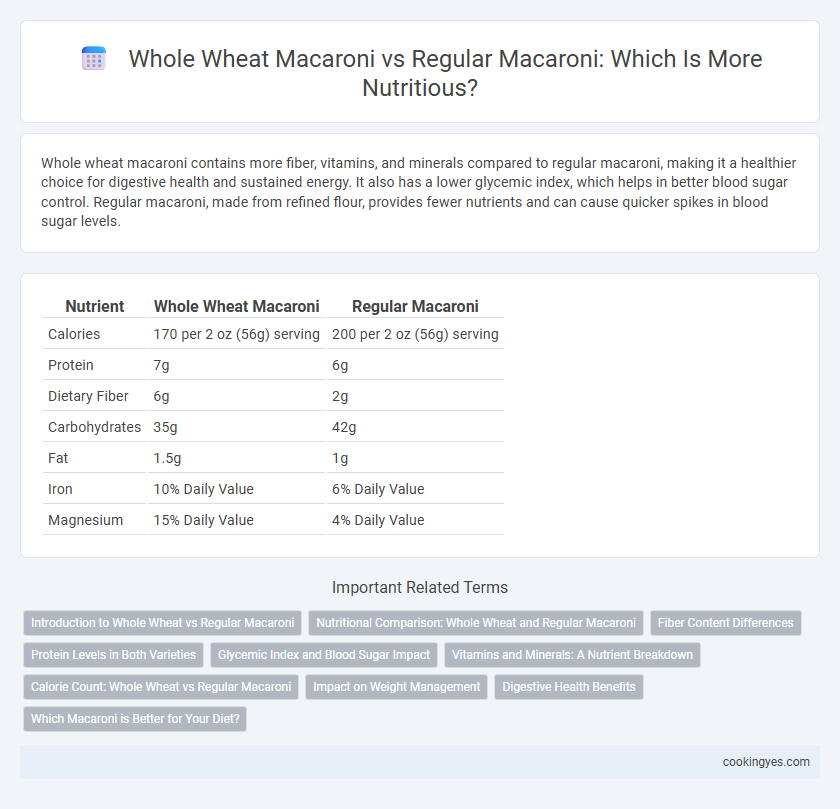Whole wheat macaroni contains more fiber, vitamins, and minerals compared to regular macaroni, making it a healthier choice for digestive health and sustained energy. It also has a lower glycemic index, which helps in better blood sugar control. Regular macaroni, made from refined flour, provides fewer nutrients and can cause quicker spikes in blood sugar levels.
Table of Comparison
| Nutrient | Whole Wheat Macaroni | Regular Macaroni |
|---|---|---|
| Calories | 170 per 2 oz (56g) serving | 200 per 2 oz (56g) serving |
| Protein | 7g | 6g |
| Dietary Fiber | 6g | 2g |
| Carbohydrates | 35g | 42g |
| Fat | 1.5g | 1g |
| Iron | 10% Daily Value | 6% Daily Value |
| Magnesium | 15% Daily Value | 4% Daily Value |
Introduction to Whole Wheat vs Regular Macaroni
Whole wheat macaroni contains higher dietary fiber, essential minerals like magnesium and zinc, and more protein compared to regular macaroni, which is made from refined wheat flour. The bran and germ retained in whole wheat pasta provide antioxidants and promote better digestive health, whereas regular macaroni has lower fiber content and faster glycemic impact. Choosing whole wheat macaroni supports sustained energy release and improved nutrient intake crucial for balanced diets.
Nutritional Comparison: Whole Wheat and Regular Macaroni
Whole wheat macaroni contains higher fiber content, essential vitamins such as B-complex, and minerals like magnesium compared to regular macaroni, which is primarily made from refined flour with lower nutrient density. The glycemic index of whole wheat macaroni is also lower, promoting better blood sugar control and sustained energy release. Regular macaroni may offer slightly more calories per serving but lacks the significant nutritional benefits found in whole wheat varieties.
Fiber Content Differences
Whole wheat macaroni contains significantly higher dietary fiber compared to regular macaroni, typically providing around 6 grams of fiber per serving versus 2 grams in regular versions. This increased fiber content supports better digestive health and helps maintain steady blood sugar levels. Choosing whole wheat macaroni can contribute to greater satiety and improved cardiovascular health due to its rich fiber profile.
Protein Levels in Both Varieties
Whole wheat macaroni contains higher protein levels compared to regular macaroni, offering approximately 7-8 grams of protein per cooked cup versus 5-6 grams in the regular variety. The increased protein content in whole wheat macaroni supports muscle repair and satiety, making it a more nutritious option for balanced diets. Whole wheat's intact bran and germ contribute to this enhanced protein profile, alongside added fiber and micronutrients.
Glycemic Index and Blood Sugar Impact
Whole wheat macaroni has a lower glycemic index (GI) compared to regular macaroni, typically ranging between 37-55 versus 50-65 for refined versions, resulting in a slower release of glucose into the bloodstream. This slower digestion helps in better blood sugar regulation and reduces spikes in insulin levels, making whole wheat macaroni a preferable choice for individuals managing diabetes or insulin resistance. The higher fiber content in whole wheat macaroni also contributes to improved glycemic control and sustained energy release.
Vitamins and Minerals: A Nutrient Breakdown
Whole wheat macaroni contains significantly higher levels of essential vitamins and minerals compared to regular macaroni, including increased amounts of B vitamins such as thiamine, riboflavin, and niacin, which support energy metabolism. It also provides more magnesium, zinc, and iron, vital for immune function, bone health, and oxygen transport, due to the retention of bran and germ in the whole grain. Regular macaroni, made from refined flour, lacks many of these nutrients as the milling process removes the nutrient-rich outer layers.
Calorie Count: Whole Wheat vs Regular Macaroni
Whole wheat macaroni contains roughly 150-170 calories per cooked cup, slightly lower than regular macaroni's 200 calories per cooked cup, making it a favorable option for calorie-conscious diets. It also provides more dietary fiber, usually around 6 grams per serving, compared to 2 grams in regular macaroni, aiding in digestion and satiety. Choosing whole wheat macaroni supports better blood sugar control and sustained energy release due to its lower glycemic index.
Impact on Weight Management
Whole wheat macaroni contains higher fiber content and essential nutrients compared to regular macaroni, promoting better satiety and potentially aiding in weight management by reducing overall calorie intake. Regular macaroni, made from refined flour, has a higher glycemic index, which can lead to quicker spikes in blood sugar and increased hunger. Choosing whole wheat macaroni supports more stable energy levels and longer-lasting fullness, assisting in appetite control and weight regulation.
Digestive Health Benefits
Whole wheat macaroni contains higher dietary fiber compared to regular macaroni, promoting better digestive health by improving bowel regularity and preventing constipation. The increased fiber content in whole wheat supports the growth of beneficial gut bacteria, enhancing overall gut microbiota balance. Regular macaroni, made from refined flour, lacks these fibers, making whole wheat macaroni a superior choice for digestive wellness.
Which Macaroni is Better for Your Diet?
Whole wheat macaroni contains higher fiber content, more vitamins like B-complex, and minerals such as iron and magnesium compared to regular macaroni, making it a more nutrient-dense option. Regular macaroni, made from refined flour, has fewer nutrients and a higher glycemic index, which can cause rapid blood sugar spikes. Choosing whole wheat macaroni supports better digestion, sustained energy levels, and improved heart health, making it the superior choice for a balanced diet.
Whole wheat macaroni vs Regular macaroni for nutrition Infographic

 cookingyes.com
cookingyes.com